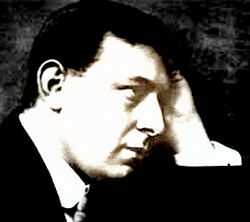Frederic Zelnik
Frederic Zelnik (May 17, 1885 - November 29, 1950) was one of the most important producers-directors of the German silent cinema. He also appeared on screen as an actor.[1]

Early life and career
Friedrich Zelnik was born in a Jewish family in Czernowitz, today in Ukraine (Ukrainian: Chernivtsi), at the time the capital of the Duchy of Bukovina in the Austrian part of the Austro-Hungarian Monarchy. Czernowitz has been then largely populated by Jews and has been after Wilno the most an important city for the Jewish culture in Eastern Europe. After the studies in Vienna, Friedrich Zelnik worked as an actor in theaters in Nürnberg, Aachen, Worms, Prague and finally Berlin - in the theaters Theater an der Königsgrätzer Straße, Berliner Theater, Komödienhaus.
In 1914 Friedrich Zelnik began acting in films, and after 1915 producing and directing movies while still appearing in roles as an actor in other director's films. In 1918 he married a young Polish ballet dancer turned film actress named Lya Mara and promoted her to stardom by producing and directing movies for her. In 1920 he established a film production firm Zelnik-Mara-Film GmbH.
Popular, operetta style costume films like An der schönen blauen Donau, Die Försterchristl, Das Tanzende Wien, Heut' tanzt Mariett brought Lya Mara and Zelnik enormous success in Germany and beyond. Several of his collaborators, such as with cameraman Frederik Fuglsang and production designer André Andrejew are perceived today as important artists of the German silent cinema.
Upon the introduction of sound film, Friedrich Zelnik became the first director in Europe to postsynchronize a movie, The Crimson Circle (1929), using the DeForest Phonofilm sound-on-film process. In 1930, Zelnik travelled to Hollywood, California and upon his return directed his first full sound film, a new version of his silent success Die Försterchristl.
After Hitler took power in 1933, Zelnik and Lya Mara left Germany for London. In the following years, Zelnik continued to direct and produce movies in Great Britain and The Netherlands. He also changed his name to Frederic Zelnik and took British citizenship.
Friederich Zelnik died in 1950 in London.
Selected filmography
Director
- Count Varenne's Lover (1921)
- The Girl from Capri (1924)
- The Bohemian Dancer (1926)
- The Mill at Sanssouci (1926)
- The Blue Danube (1926)
- The Weavers (1927)
- Dancing Vienna (1927)
- My Heart is a Jazz Band (1929)
- Der rote Kreis (1929)
- Happy (1933)
- The Emperor's Waltz (1933)
- Southern Roses (1934)
- The Lilac Domino (1937)
- I Killed the Count (1939)
References
- Hans-Michael Bock (Ed.): The Concise CineGraph. Encyclopedia of German Cinema. New York, Oxford: Berghahn Books 2009, p. 548-549
External links
|